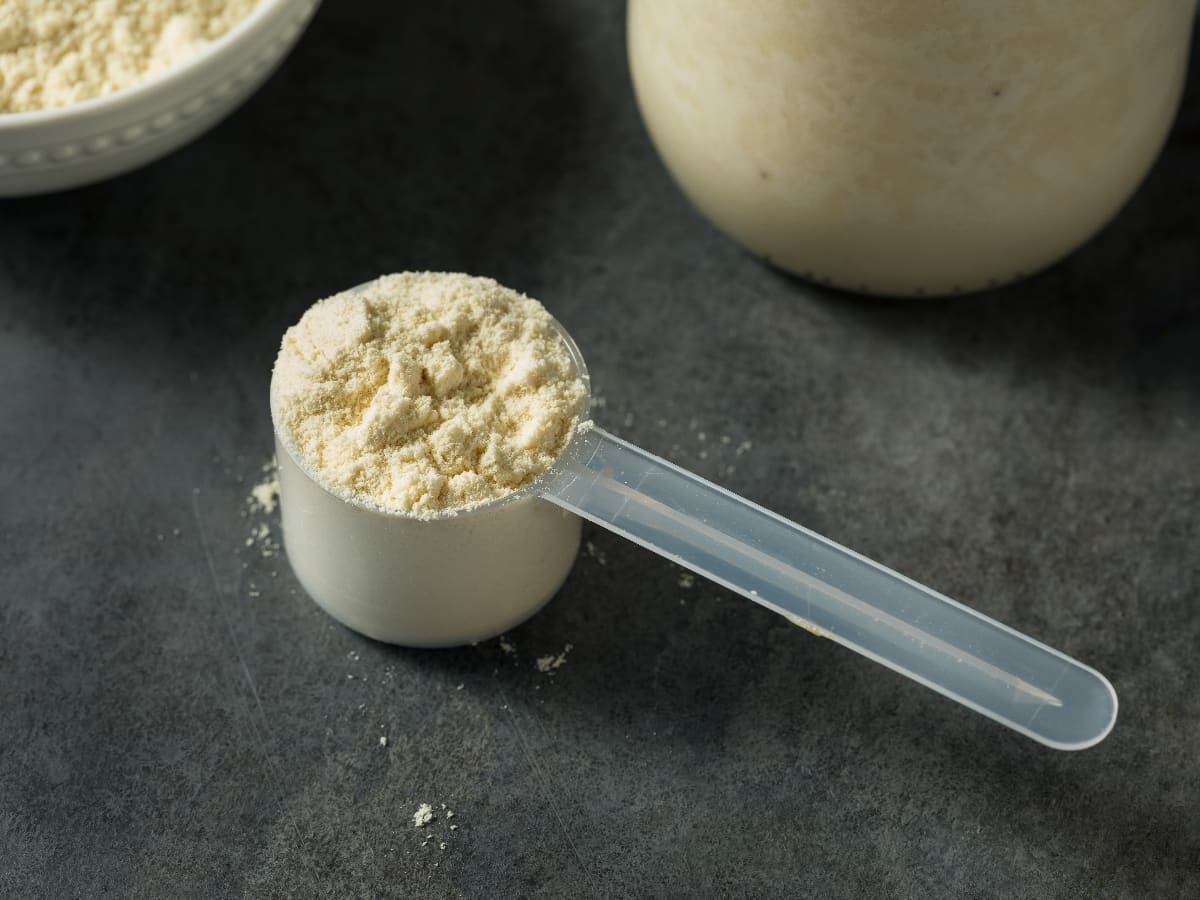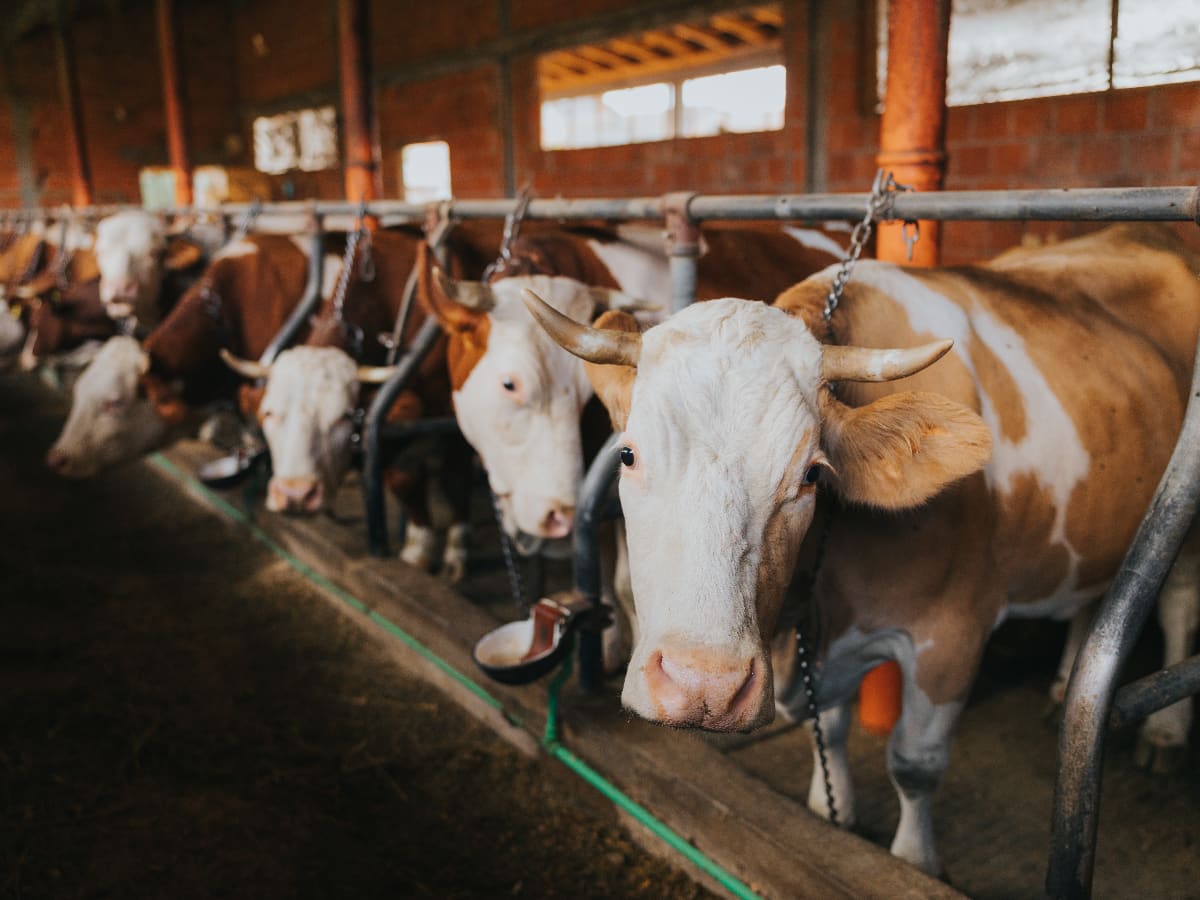Among the various protein sources available, whey protein stands out as a popular choice due to its effectiveness in supporting muscle growth, recovery, and overall wellness.
However, not all whey proteins are created equal. Enter grass-fed whey protein a premium alternative that has been gaining traction among health enthusiasts and conscientious consumers alike. In this ultimate guide, we'll delve into the benefits of grass-fed whey protein and why it's worth considering as part of your dietary regimen.
Whey protein is a byproduct of cheese production, extracted during the process of separating milk into curds and whey. It's renowned for its high protein content and excellent amino acid profile, making it a valuable dietary supplement for athletes, fitness enthusiasts, and anyone looking to boost their protein intake conveniently.

Grass-fed whey protein, as the name suggests, is sourced from the milk of grass-fed cows. Unlike conventional whey protein, which may come from cows raised on a diet of grains and supplemented with hormones and antibiotics, grass-fed whey protein is derived from cows that graze on pasture year-round, enjoying a diet closer to what nature intended.
What Is Whey Protein?
Whey protein is a mixture of proteins isolated from whey, the liquid portion of milk that separates during cheese production. It is available in various forms, including whey protein concentrate, whey protein isolate, and whey protein hydrolysate. These forms differ in their protein content and processing methods, but they all offer a rich source of essential amino acids necessary for muscle repair, growth, and overall bodily functions.
Sources of Whey Protein:
Whey protein can be sourced from both animal and plant-based sources. Animal-based whey protein is derived from cow's milk and is the most common form available on the market. It contains a complete amino acid profile, including all nine essential amino acids required by the body. Plant-based alternatives, such as pea protein and soy protein, are also available for people following vegetarian or vegan diets.
Nutritional Composition of Whey Protein:

Whey protein is renowned for its high protein content and excellent amino acid profile. It typically contains all nine essential amino acids, including branched-chain amino acids (BCAAs) like leucine, isoleucine, and valine, which are crucial for muscle protein synthesis and recovery. Additionally, whey protein is low in fat and carbohydrates, making it an ideal choice for people looking to increase their protein intake without significantly impacting their calorie or carbohydrate consumption.
Grass-Fed vs. Conventional Whey Protein
When it comes to whey protein, not all sources are created equal. Grass-fed whey protein stands apart from its conventional counterparts in several key ways, making it a superior choice for those seeking optimal nutrition and health benefits.
Grass-fed whey protein is derived from the milk of cows that have been exclusively fed a diet of grass and forage throughout their lives. This natural diet is in line with the evolutionary needs of cows and ensures that they receive the essential nutrients necessary for their well-being.
One of the distinguishing characteristics of grass-fed whey protein is the absence of artificial additives or hormones often found in conventional whey protein sources. Grass-fed cows are not subjected to growth hormones or antibiotics commonly used in intensive farming practices, resulting in a cleaner and more natural product.
Key Differences Between Grass-Fed and Conventional Whey Protein
The nutritional profile of grass-fed whey protein sets it apart from conventional whey protein in several significant ways. Grass-fed whey contains higher levels of beneficial nutrients such as omega-3 fatty acids and conjugated linoleic acid (CLA), which have been linked to various health benefits including improved heart health and reduced inflammation.
Furthermore, grass-fed whey protein tends to have a superior amino acid profile compared to conventional whey protein. Amino acids are the building blocks of protein and play a crucial role in muscle growth, repair, and overall health. Grass-fed whey protein is typically richer in essential amino acids, particularly branched-chain amino acids (BCAAs) like leucine, which are essential for muscle protein synthesis.
Environmental and Ethical Considerations

Choosing grass-fed whey protein also aligns with environmental and ethical concerns. Cows raised on pasture-based diets have a lower carbon footprint compared to those raised in intensive feedlot operations. Additionally, supporting grass-fed farming practices promotes sustainable land management and contributes to the preservation of natural ecosystems.
From an ethical standpoint, grass-fed dairy farming tends to prioritize the welfare of animals, providing them with access to open pastures and natural grazing habitats. This humane approach to animal husbandry ensures that cows are treated with respect and dignity, a consideration that resonates with many consumers seeking ethically sourced food products.
Grass-fed whey protein offers a multitude of benefits over conventional whey protein, including a superior nutritional profile, environmental sustainability, and ethical considerations. By choosing grass-fed whey protein, consumers can enjoy a cleaner, more nutrient-rich protein source that supports their health and well-being while also promoting sustainable and ethical farming practices.
Benefits of Grass-Fed Whey Protein
Grass-fed whey protein stands out as a superior option for those seeking optimal nutrition and health benefits. Here, we delve into the distinct advantages that grass-fed whey protein offers over its conventional counterparts.
Higher Nutritional Quality
- Increased Levels of Omega-3 Fatty Acids and CLA
Grass-fed whey protein derives from cows that graze on pasture, resulting in higher levels of beneficial nutrients such as omega-3 fatty acids and conjugated linoleic acid (CLA). Omega-3s are renowned for their anti-inflammatory properties, supporting heart health and cognitive function. CLA, on the other hand, has been linked to weight management and improved body composition.
- Rich in Essential Nutrients and Antioxidants
Grass-fed whey protein contains elevated levels of vitamins, minerals, and antioxidants compared to its conventional counterpart. This nutritional profile stems from the cows' natural diet of grass and forage, which enhances the protein's overall health-promoting properties. Antioxidants help combat oxidative stress and protect cells from damage, contributing to overall well-being.
Superior Protein Profile
- Higher Concentration of Beneficial Amino Acids
Grass-fed whey protein boasts a superior amino acid profile, including higher levels of essential amino acids such as leucine, isoleucine, and valine. These amino acids play crucial roles in muscle protein synthesis, making grass-fed whey protein an ideal choice for athletes and fitness enthusiasts looking to optimize recovery and muscle growth.
- Improved Bioavailability and Absorption
The bioavailability of protein refers to the proportion of ingested protein that is absorbed and utilized by the body. Grass-fed whey protein demonstrates superior bioavailability compared to other protein sources, allowing for efficient uptake and utilization by the muscles. This attribute ensures that your body can effectively reap the benefits of the protein consumed, supporting various physiological functions.
Potential Health Benefits
- Support for Muscle Growth and Repair
 Grass-fed whey protein provides the essential building blocks necessary for muscle repair and growth, making it an invaluable supplement for people engaged in resistance training or endurance exercise. Its rich amino acid profile, particularly its high leucine content, stimulates muscle protein synthesis, facilitating muscle recovery and adaptation.
Grass-fed whey protein provides the essential building blocks necessary for muscle repair and growth, making it an invaluable supplement for people engaged in resistance training or endurance exercise. Its rich amino acid profile, particularly its high leucine content, stimulates muscle protein synthesis, facilitating muscle recovery and adaptation.
- Aid in Weight Management and Satiety:
Protein is well-known for its role in promoting satiety and regulating appetite, making it a valuable tool for weight management. Grass-fed whey protein, with its superior protein quality and nutrient density, can help curb cravings and promote feelings of fullness, thus supporting weight loss or weight maintenance goals.
- Enhanced Immune Function and Overall Well-being:
The nutrients and bioactive compounds found in grass-fed whey protein, including immunoglobulins, lactoferrin, and antioxidants, have been shown to support immune function and bolster overall health. By providing a diverse array of nutrients that support immune system function, grass-fed whey protein contributes to resilience against infections and illnesses, promoting vitality and well-being.
How to Choose the Best Grass-Fed Whey Protein
When it comes to selecting the best grass-fed whey protein, it's essential to understand what to look for and how to make informed choices. Here's a guide to help you navigate through the options and choose a high-quality product that aligns with your health and fitness goals:
Reading labels: what to look for
- Grass-fed certification: Look for products that explicitly state "grass-fed" on the label. Ideally, the label should also indicate that the cows were pasture-raised and had access to fresh grass year-round.
- Minimal processing: Opt for products that are minimally processed and free from artificial additives, flavors, and sweeteners. A short and recognizable ingredient list is a good indicator of purity.
- Protein content: Check the protein content per serving to ensure it meets your dietary requirements. Most grass-fed whey protein supplements offer around 20-25 grams of protein per serving.
Quality certifications and third-party testing
- Certifications: Look for certifications from reputable organizations such as the American Grassfed Association (AGA) or Certified Humane to verify the grass-fed and ethical sourcing of the product.
- Third-party testing: Choose products that undergo third-party testing for quality, purity, and potency. Look for certifications from organizations like NSF International or Informed-Choice to ensure the absence of contaminants and banned substances.
Researching reputable brands and sources

- Brand reputation: Research and choose brands with a solid reputation for transparency, quality, and integrity. Read customer reviews and testimonials to gauge the overall satisfaction with the product.
- Sourcing practices: Investigate the brand's sourcing practices and commitment to sustainability and animal welfare. Look for information on their website regarding the sourcing of raw materials and their ethical standards.
- Transparency: Select brands that provide detailed information about their sourcing, manufacturing processes, and quality control measures. Transparency is key to building trust with consumers.
By paying attention to these factors and doing your due diligence, you can confidently choose the best grass-fed whey protein that not only meets your nutritional needs but also supports ethical and sustainable practices in the food industry. Remember that investing in high-quality protein supplements is an investment in your health and well-being.
Incorporating Grass-Fed Whey Protein into Your Diet
When it comes to incorporating grass-fed whey protein into your diet, the key is balance and moderation. Here's a guide to help you make the most of this nutritious supplement:
Recommended Daily Intake:
- The recommended daily intake of protein varies depending on factors such as age, gender, weight, and activity level.
- As a general guideline, aim for around 0.8 to 1.2 grams of protein per kilogram of body weight per day.
- Grass-fed whey protein can be a convenient way to meet your protein needs, especially for people with active lifestyles or those looking to build muscle.
Timing and Dosage for Optimal Results:
- Timing your grass-fed whey protein intake can optimize its benefits. Consuming it within 30 minutes to an hour after a workout can support muscle recovery and growth.
- You can also use grass-fed whey protein as a snack or meal replacement throughout the day to help maintain satiety and support your overall protein intake.
- Dosage recommendations vary depending on individual goals and protein requirements. Start with a serving size recommended on the product label and adjust as needed based on your dietary needs and fitness goals.
Creative Ways to Use Grass-Fed Whey Protein in Recipes:

- Smoothies: Blend grass-fed whey protein powder with fruits, vegetables, and your choice of liquid (such as almond milk or coconut water) for a quick and nutritious post-workout snack.
- Protein Pancakes or Waffles: Add grass-fed whey protein powder to your favorite pancake or waffle recipe for a protein-packed breakfast or brunch option.
- Energy Bites or Bars: Mix grass-fed whey protein powder with nuts, seeds, and natural sweeteners to create homemade energy bites or protein bars for on-the-go fuel.
- Yogurt Parfaits: Stir grass-fed whey protein powder into Greek yogurt and top with berries, nuts, and a drizzle of honey for a satisfying and protein-rich dessert or snack.
Frequently Asked Questions
What exactly is grass-fed whey protein, and how is it different from regular whey protein?
Grass-fed whey protein comes from cows that are raised on pasture and primarily fed a diet of grass. This results in a protein powder that is higher in beneficial nutrients like omega-3 fatty acids and conjugated linoleic acid (CLA), compared to whey protein sourced from conventionally raised cows fed a diet of grains and soy.
What are the main benefits of choosing grass-fed whey protein over conventional options?
Grass-fed whey protein offers superior nutritional quality, with higher levels of essential nutrients, antioxidants, and beneficial fatty acids. It also has a superior protein profile, providing a rich concentration of essential amino acids that support muscle growth, repair, and overall recovery. Additionally, grass-fed whey protein is often considered more environmentally sustainable and supports ethical farming practices.
Is grass-fed whey protein suitable for people with lactose intolerance or dairy sensitivities?
While grass-fed whey protein may contain lower levels of lactose compared to conventional whey protein, it still contains some lactose and dairy proteins. Individuals with lactose intolerance or dairy sensitivities should exercise caution and consider alternative protein sources, such as plant-based protein powders.
How can I ensure that the grass-fed whey protein I'm purchasing is of high quality?
Look for grass-fed whey protein products that are third-party tested and certified by reputable organizations. Reading labels carefully can also help you identify products that prioritize ethical sourcing and sustainable farming practices. Additionally, researching reputable brands known for their commitment to quality and transparency can help you make an informed decision.
How should I incorporate grass-fed whey protein into my diet for optimal results?
 Grass-fed whey protein can be consumed in various ways, such as mixed into shakes or smoothies, added to oatmeal or yogurt, or used in baking recipes. The recommended daily intake may vary depending on individual goals and activity levels, but incorporating grass-fed whey protein into your post-workout routine or as a convenient snack can help support muscle recovery and overall health. It's essential to follow serving size recommendations and listen to your body's needs.
Grass-fed whey protein can be consumed in various ways, such as mixed into shakes or smoothies, added to oatmeal or yogurt, or used in baking recipes. The recommended daily intake may vary depending on individual goals and activity levels, but incorporating grass-fed whey protein into your post-workout routine or as a convenient snack can help support muscle recovery and overall health. It's essential to follow serving size recommendations and listen to your body's needs.
Conclusion
In conclusion, the benefits of incorporating grass-fed whey protein into your diet are numerous and significant. Grass-fed clean whey protein offers superior nutritional quality compared to its conventional counterparts. With higher levels of essential nutrients, antioxidants, and beneficial fatty acids like omega-3s and CLA, grass-fed whey protein provides a powerhouse of nutrition that can support your overall health and fitness goals.
Moreover, the superior protein profile of grass-fed whey, including its rich concentration of essential amino acids, translates to better muscle growth, repair, and overall recovery. Whether you're an athlete striving for peak performance or someone looking to support your fitness journey, grass-fed whey protein can be a valuable addition to your regimen.
It's important to remember that not all whey protein is created equal. When selecting a grass-fed whey protein product, be sure to carefully read labels, look for quality certifications, and choose reputable brands that prioritize ethical sourcing and rigorous testing.
While grass-fed whey protein may come at a slightly higher cost and present sourcing challenges compared to conventional options, the investment in your health and the well-being of the planet is well worth it. By choosing grass-fed whey protein, you're not only nourishing your body with superior nutrition but also supporting sustainable and humane agricultural practices.
Watch AFIL test kits testimonial videos click here
References:
- Barenie, Matthew J., et al. "Grass-Fed and Non-Grass-Fed Whey Protein Consumption Do Not Attenuate Exercise-Induced Muscle Damage and Soreness in Resistance-Trained Individuals: A Randomized, Placebo-Controlled Trial." Journal of Dietary Supplements (2023): 1-30.
- Grass-fed, Flash-Pasteurized, and Undenatured Ultra-Filtrated. "The Ultimate Whey Protein Guide."
- Ben, D. C. "The Best Whey Protein for Muscle Growth and Getting Lean."


.png?v=1737390083)
.png?v=1737187409)


